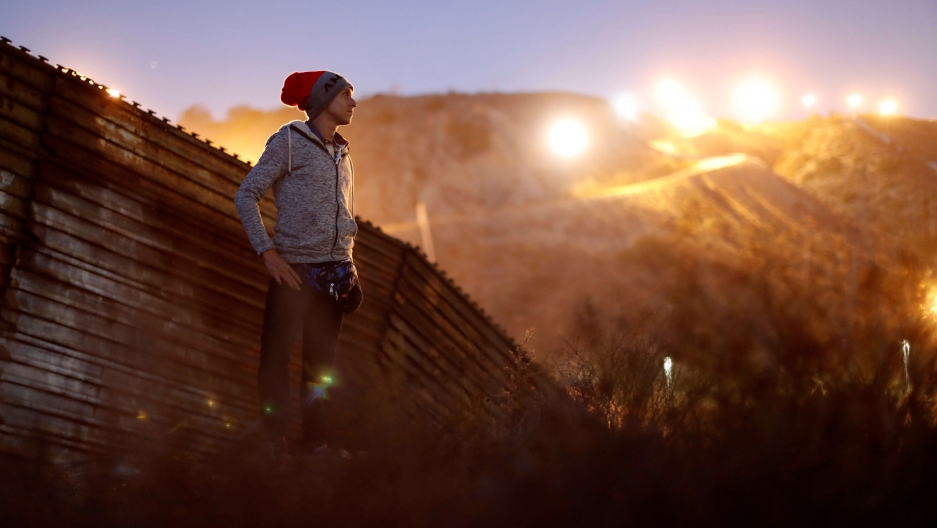National Sovereignty and the Unstoppable Migration
"[The new U.S. policy on migrants remaining in Mexico until their applications for asylum in the U.S. have been vetted] will extremely limit people’s ability to access asylum in the United States."
"How are people going to have access to due process if they are waiting in Mexico and their asylum cases are being adjudicated in the United States?""How are they going to have access to lawyers, translation?"Gretchen Kuhner, director, Mexico City-based Institute for Women in Migration
"So far it seems as though Mexico is acquiescing to this."
"There will be elements from [Lopez Obrador’s] own party that say, ‘Why are we giving into the Americans? Why are we doing the Americans’ dirty work'?"
Duncan Wood, head, Mexico Institute, Washington, DC-based Wilson Center
 |
A migrant from Honduras, part of a caravan of thousands traveling
from Central America en route to the United States, poses in front of
the border wall between the US and Mexico in Tijuana, Mexico, Nov. 23,
2018.
Credit: Kim Kyung-Hoon/Reuters
|
These new policies have encouraged more migration caravans from Central America to head to Mexico. Another large one, with over 12,000 people is headed to Mexico, many among them claiming their intention to reach Mexico, and remain there. For the time being, in any event. Many are aware that they are leaving their home countries mired in violence and poverty, and heading to another country in which violence and poverty dominate as well. Choosing to overlook that in America too poverty and violence is prevalent.
 |
| Aerial view of Honduran migrants onboard a truck as they take part in a caravan heading to the US, in the outskirts of Tapachula, on their way to Huixtla, Chiapas state, Mexico, on October 22, 2018. |
President Obrador's invitation to migrants fits right in with his broader desire in protection of human rights, to reduce inequality and to prioritize the interests of the poor, serving as a counterpoint to the position taken by the White House. His policy, however, will without doubt create even greater strains. Caravans of migrants are responding in part to Mexico's new openness to accepting migrants while the migrants consider the new opportunity to be a temporary stop-gap on their way to the U.S.
"The humanitarian visa that they're giving now is the reason we are here. Later, if possible, we can get to the United States", stated Carlos del Valle, a Guatemalan teacher, applying for the Mexican visa on the bridge that connects his country with Mexico. The issuance of such visas has been expedited from five days rather than the month it has taken up to now, a permanent change in policy. Representing Mr. Obrador's strategic interests in presenting Mexico's immigration policy as more humane.
 |
| Mexican navy personnel hand out food to Central American migrants stuck in no man’s land on the bridge over the Suchiate River that is the border between Guatemala and Mexico, near Ciudad Hidalgo, Mexico, Saturday, Oct. 20, 2018. |
The Trump administration last month announced a new policy to return most asylum-seekers to Mexico arriving at the border by land, intended to discourage Central Americans from planning to migrate to the United States. Petitioners are now required to remain in Mexico while awaiting their case outcomes, thus easing pressure on the overworked U.S. asylum system.
Over 12,000 people arriving at the Guatemala/Mexico border have been encouraged to apply for the humanitarian Mexico visa at Ciudad Hidalgo. A proportion of the migrants state their intention to remain in Mexico to avail themselves of job programs sponsored by the government, but many see safe-passage permits in the visas, to attain Mexico's northern border, and when the time seems right, cross into the United States.
 |
| Aerial view of a Honduran migrant caravan heading to the US, on the Guatemala-Mexico international border bridge in Ciudad Hidalgo, Chiapas state, Mexico, on October 20, 2018. |
Mexico, citing a labour shortage, is attempting to fill thousands of low-skilled jobs with migrant labour, promoting job creation in southern Mexico with a proposed $30-billion regional development plan, ordering tax cuts in municipalities along the northern border to spur economic development and the creation of jobs. The minimum wage was recently raised by about 16 percent. All of which fails to persuade many caravan participants to remain in Mexico, their hopes still set on the U.S.
"Even though I have to wait five days for the pass to get into Mexico, later I will see how to get to the United States", stated Franklin Caballero, 30, from Honduras, deported from the U.S. as an undocumented immigrant for driving without a license. He plans to pay a smuggler in northern Mexico to sneak him across the border into the United States.
 |
| A Catholic nun gives travel advice to Central American migrants riding in the bed of a semi-trailer, as they move toward the U.S. border, in Ixtlán del Rio, Nayarit, Mexico, Tuesday, Nov. 13, 2018. |
Labels: Borders, Guatemala, Honduras, Mexico, Migration, United States

<< Home